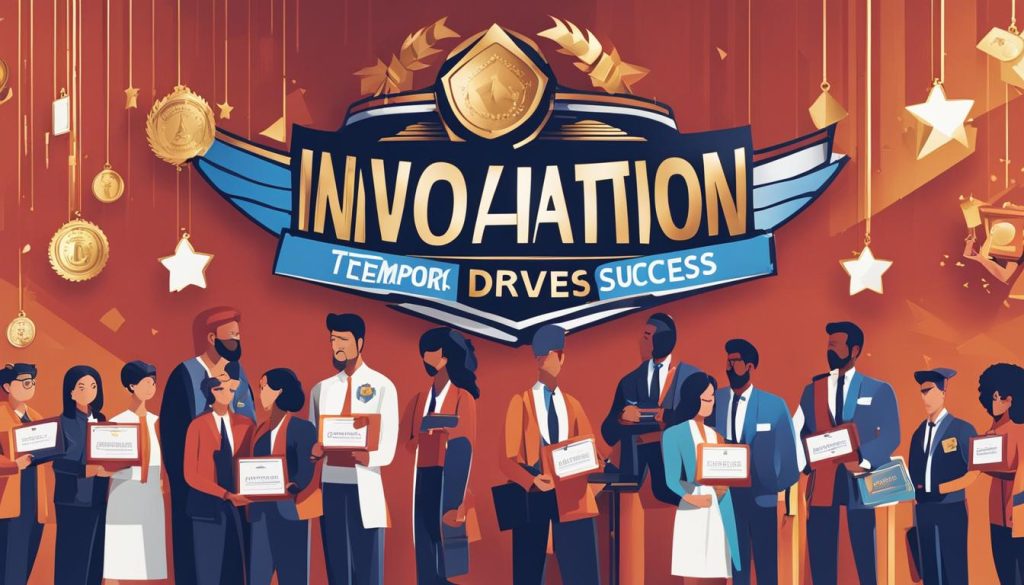Welcome to this article on how recognition can positively impact employee engagement and retention in the workplace. As a professional in this field, I am excited to share effective strategies for implementing employee recognition programs that improve employee morale and retain top talent.
Recognition is crucial in creating a positive work environment that promotes job satisfaction and loyalty. A company’s recognition program should be designed to celebrate employees’ accomplishments and encourage continuous growth. In this article, we will delve into the benefits of employee recognition and provide practical recommendations for enhancing employee satisfaction.
Key Takeaways:
- Implementing employee recognition programs can boost employee engagement and improve overall morale in the workplace.
- Recognizing employee performance is essential to promoting job satisfaction and loyalty.
- Effective strategies for employee recognition involve tailoring programs to enhance employee satisfaction and expressing appreciation in ways that resonate with employees.
- Retention of top talent can be achieved through employee recognition, which encourages a positive work environment that talented individuals want to stay with.
- Prioritizing employee recognition as part of the organizational culture can have long-lasting benefits.
The Benefits of Employee Recognition
Implementing employee recognition programs provides numerous benefits that can contribute to a positive work environment, increase employee engagement, and reduce turnover rates. One of the key advantages of employee recognition is its ability to enhance employee satisfaction and improve overall morale in the workplace.
By recognizing employees’ hard work and efforts, employers can demonstrate their commitment to their employees, which fosters a sense of loyalty and engagement. This can lead to increased job satisfaction, motivation, and productivity, ultimately helping to retain top talent and promote a positive company culture.
Recognition for employee performance is also crucial to maintaining a healthy work environment. Employees who feel valued and appreciated are more likely to go above and beyond expectations, leading to higher levels of customer satisfaction and higher quality work. On the other hand, employees who feel neglected or unappreciated may become disengaged, leading to subpar performance and lower productivity.
Recognition programs can also provide opportunities for employees to receive feedback and gain new skills, contributing to their personal and professional growth. This can lead to increased job satisfaction and retention, as employees feel they are being invested in and valued.
“People may take a job for more money, but they often leave it for more recognition.”
Overall, utilizing effective employee recognition strategies can lead to numerous benefits for both employers and employees, including higher levels of engagement, retention of top talent, and a more positive work environment. It is crucial for employers to prioritize employee recognition in order to create a culture that values and invests in its employees.
Effective Strategies for Employee Recognition

Recognizing employees for their hard work and contributions is an important part of building an engaged and satisfied workforce. Implementing effective employee recognition programs can not only boost morale but can also increase productivity and reduce turnover rates. In this section, I will provide practical strategies for implementing employee recognition programs to enhance employee satisfaction and productivity.
Types of Employee Recognition Programs
There are various types of recognition programs that can be implemented to suit specific organizational needs. Some popular programs include:
| Type of Recognition Program | Description |
|---|---|
| Employee of the Month/Quarter/Year | Award given to the employee who has performed exceptionally well over the specified period of time |
| Peer Recognition Programs | An initiative where peers nominate each other for going above and beyond their job requirements. |
| Spot Awards | A small recognition given to employees who demonstrated excellent performance, behavior or any other outstanding actions. |
| Wellness Programs | Recognition provided to employees for maintaining healthy habits – physical and mental, and dedicating time to self-care. |
Techniques for Effective Employee Recognition
While implementing recognition programs is important, how you execute recognition is equally important to ensure its effectiveness. Here are some effective techniques to express appreciation and recognition:
- Public Praise: Recognize an employee’s contribution in front of the team or in company meetings.
- Personalized Recognition: Recognize employees for their unique strengths and contributions that may go unnoticed by others.
- Timely Recognition: Ensure the recognition is given promptly, in real-time or no later than two weeks from the accomplishment.
- Customization: Tailor recognition to the individual recipient’s values and preferences, ensuring maximum impact.
Implementing effective employee recognition programs that align with an organization’s needs is a key driver of employee satisfaction and engagement. Recognition must be executed effectively, keeping in view identified objectives. By consistently recognizing employees, organizations can create a positive work environment where employees feel valued and motivated to perform their best.
Retaining Top Talent through Recognition

As we discussed earlier, employee recognition programs have a significant impact on increasing employee engagement and retention. Top talent is particularly important to an organization as they bring unique skills and experience that contribute to the growth and success of the company. However, the competition for retaining such talent is high, necessitating that companies identify ways to retain them over the long term.
Employee recognition programs offer an effective solution to this challenge. Such programs recognize and appreciate the contributions of top talent, making them feel valued and appreciated, thus encouraging them to remain with the organization. Through recognition programs, employees are also more likely to be engaged and loyal to the company, leading to increased retention rates.
Recognition programs can take many forms, including verbal appreciation, recognition events, awards, and access to development opportunities. By offering recognition through various channels, organizations can ensure that top talent receives the acknowledgment they deserve in a meaningful and personal way, increasing their commitment to the organization and its long-term success.
Moreover, such programs not only benefit top talent. They also create a culture of recognition that encourages all employees to strive for excellence, increasing the overall retention rates of the organization. As employees become more engaged and satisfied with their work environment, they are more likely to remain loyal to the organization, reducing the costs associated with turnover.
To summarize, recognition programs are essential tools for retaining top talent and creating a positive organizational culture. By providing personalized and meaningful recognition to employees, organizations can increase their engagement, satisfaction, and loyalty to the company, reducing turnover and promoting overall success.
Conclusion
Employee recognition programs are crucial in boosting engagement and retention in the workplace. As we have discussed in this article, recognition plays a vital role in improving employee morale, retaining top talent, and creating a positive work environment. Through effective recognition strategies, organizations can enhance employee satisfaction and create a culture that prioritizes employee well-being.
It is essential for employers to recognize the efforts of their employees and express appreciation for their hard work. Employee recognition programs are a simple yet effective way to achieve this. By fostering a culture of recognition, organizations can increase employee engagement and retention while reducing turnover.
It is important to note that recognition programs should be tailored to the specific needs and preferences of the organization and its employees. Whether it is through formal recognition programs or informal gestures of appreciation, the goal is to create a culture that values and recognizes employees for their contributions.
To sum up, employee recognition programs are an important aspect of organizational culture. They not only enhance employee satisfaction and retention but also contribute to overall success. I encourage all employers to prioritize employee recognition programs and make it an integral part of their workplace culture.
FAQ
How can employee recognition programs increase engagement and retention?
Employee recognition programs play a crucial role in increasing employee engagement and retention. Recognizing employees for their hard work and achievements motivates them to perform at their best, fosters a positive work environment, and strengthens their loyalty to the organization. By acknowledging and appreciating their efforts, employees feel valued and respected, which boosts their overall engagement and increases their desire to stay with the company.
What are the benefits of implementing employee recognition programs?
Implementing employee recognition programs offers numerous benefits. It improves employee morale, enhances job satisfaction, and fosters a sense of belonging. Recognition programs also contribute to increased productivity, improved teamwork, and a positive company culture. When employees feel appreciated and valued, they are more likely to be motivated, engaged, and committed to achieving their goals.
What are some effective strategies for employee recognition?
Effective employee recognition strategies involve both formal and informal practices. Formal strategies include structured programs like employee of the month awards, performance-based bonuses, and career development opportunities. Informal strategies, such as verbal praise, personalized thank-you notes, and team celebrations, also play a significant role in recognition. It’s important to tailor recognition to individual preferences and ensure it is timely, sincere, and specific, highlighting the employee’s contributions and impact.
How can employee recognition help in retaining top talent?
Employee recognition is instrumental in retaining top talent. When employees feel appreciated and recognized for their hard work, they develop a stronger sense of loyalty toward the organization. Recognition programs create a positive work environment that fosters job satisfaction and commitment. This, in turn, reduces turnover rates and retains valuable employees who contribute to the company’s growth and success.

